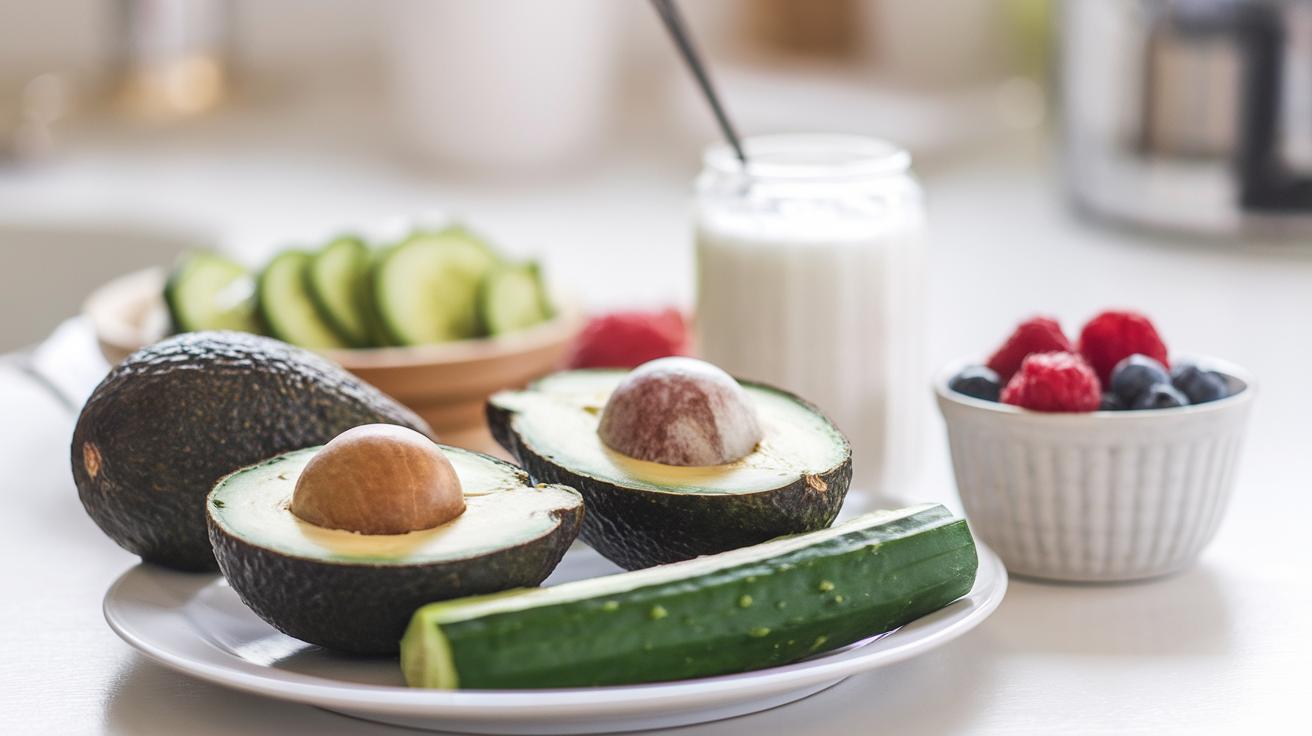Feeling bloated after a meal and wondering what went wrong? Bloating affects as many as one in four people, manifesting as a distended and uncomfortable belly, often linked to what and how you eat. Those with food intolerances or habits like overeating may experience it as a common nuisance. This guide delves into effective strategies for relief, from dietary changes that soothe the gut to quick remedies and lifestyle shifts. Learning about its causes is the first step towards managing and reducing those unwelcome episodes.
Understanding the Causes of Bloating
Bloating affects between 10% and 25% of individuals, manifesting as a sensation of fullness and tightness in the stomach. What causes bloating? The primary cause is often excess gas within the digestive tract, which can arise from various factors. An imbalance in gut bacteria is one such factor, disrupting normal digestion and leading to gas production. Additionally, the digestion of certain foods can exacerbate this condition. Food intolerances, notably lactose and gluten intolerance, impair the body's ability to break down specific substances, resulting in increased gas accumulation. Overeating, especially foods high in calories, further contributes to bloating by overburdening the digestive system.
- Excess gas in the digestive tract
- Food intolerances (e.g., lactose, gluten)
- Overeating high-calorie foods
- Hormonal changes
- Imbalance in gut bacteria
These causes can significantly impact digestion and stomach health. Excess gas can lead to discomfort and disrupt normal digestive processes, resulting in inefficient nutrient absorption and increased pressure within the intestines. Food intolerances trigger inflammation and irritation, impairing gut function and leading to symptoms like nausea or diarrhea. Overeating strains the digestive system, slowing down the process and causing prolonged fullness. Hormonal changes, particularly around the menstrual cycle, can lead to bloating by affecting fluid retention and intestinal motility. An imbalance in gut bacteria can alter digestive efficiency, highlighting the importance of maintaining a balanced gut microbiome for overall digestive health.
Dietary Changes for Bloating Relief

Dietary adjustments can play a significant role in managing and alleviating bloating. By selecting foods that support gut health and reduce gas production, individuals can experience relief from discomfort. Incorporating specific foods that are rich in nutrients, water content, and probiotics can enhance digestive efficiency and promote regularity. Conversely, avoiding foods that are high in salt, fat, and artificial sweeteners can prevent exacerbation of bloating symptoms. Implementing these dietary changes is essential for those seeking relief from bloating and improved digestive health.
Foods that help reduce bloating:
- Avocados: Nutrient-rich and contain healthy fats that aid digestion.
- Cucumbers: High water content helps prevent water retention and dehydration-related bloating.
- Yogurt: Contains probiotics that enhance gut health.
- Berries: Rich in antioxidants and polyphenols, beneficial for digestion.
- Ginger: Known for its digestive soothing properties.
- Peppermint tea: Relieves digestive distress and reduces gas.
- Papaya: Contains enzymes that improve digestion.
Foods and habits to avoid: - High-salt foods: Increase fluid retention and bloating.
- High-fat foods: Slow digestion and contribute to prolonged fullness.
- Artificial sweeteners: Difficult to digest and can cause gas.
- Carbonated drinks: Lead to trapped gas and bloating.
- Overeating: Stresses the digestive system, leading to bloating.
Hydration and meal frequency are crucial factors in managing bloating. Drinking sufficient water aids in moving food through the digestive tract, reducing the risk of constipation—a common contributor to bloating. Additionally, consuming smaller, more frequent meals can prevent the digestive system from becoming overwhelmed, facilitating smoother digestion. By maintaining these dietary habits, individuals can effectively manage bloating and support their overall digestive well-being.
What Helps With Bloating? Top Relief Tips
When experiencing bloating, quick and natural remedies can provide much-needed relief, addressing the discomfort and sluggishness associated with this common condition. Herbal teas such as peppermint and ginger are effective in soothing digestive distress and can be easily incorporated into daily routines. Physical activities like walking and yoga promote digestion and can significantly alleviate bloating symptoms. Additionally, over-the-counter remedies, including antacids, may help some individuals by neutralizing stomach acid and reducing gas buildup.
- Peppermint tea: Relieves digestive distress and reduces gas formation.
- Ginger tea: Soothes the stomach and enhances digestive efficiency.
- Walking: Encourages movement through the digestive tract, easing bloating.
- Yoga: Specific poses can relieve gas and improve digestion.
- Antacids: Over-the-counter options that can neutralize stomach acid and reduce bloating.
These remedies offer various benefits for those seeking immediate relief from bloating. Herbal teas provide natural soothing properties, while physical activities support digestive movement and efficiency. For individuals requiring additional assistance, antacids can offer quick relief by addressing acidity and gas. By incorporating these strategies, individuals can manage bloating effectively and improve their overall digestive comfort.
Lifestyle Adjustments to Prevent Bloating

Regular physical activity and adequate hydration play pivotal roles in preventing bloating. Engaging in exercises such as walking and yoga not only promotes digestion but also enhances the movement of gas through the digestive tract, minimizing discomfort. By maintaining an active lifestyle, individuals can prevent the accumulation of excess gas that leads to bloating. Hydration is equally important, as water facilitates the passage of food through the digestive system, reducing the likelihood of constipation—a common bloating culprit. Therefore, combining physical activity with proper hydration is essential for managing and preventing bloating effectively.
- Exercise: Incorporating activities like walking and yoga to improve digestion.
- Stress reduction: Practicing techniques such as meditation to decrease stress-related bloating.
- Meal timing: Eating smaller meals more frequently to avoid overwhelming the digestive system.
- Avoiding carbonated drinks: Reducing intake of fizzy beverages to prevent trapped gas.
- Gradual increase in dietary fiber: Slowly incorporating fiber-rich foods to aid digestion and manage gas.
Increasing dietary fiber intake gradually can play a significant role in preventing bloating. Fiber aids in the efficient movement of food through the digestive tract, alleviating symptoms of bloating by reducing constipation. It's crucial to introduce fiber slowly to allow the digestive system time to adjust and prevent gas buildup. Additionally, avoiding carbonated drinks can help manage bloating, as these beverages introduce excess gas into the digestive system. By implementing these lifestyle adjustments, individuals can effectively manage gas and bloating, promoting overall digestive health.
Medical Advice for Persistent Bloating
Persistent bloating that does not resolve with dietary or lifestyle changes may indicate a more serious underlying condition, such as irritable bowel syndrome (IBS) or other gastrointestinal disorders. If bloating persists for more than three weeks or is accompanied by symptoms like unexplained weight loss, blood in the stool, or severe abdominal pain, it is crucial to seek medical evaluation. These symptoms could signify conditions that require professional diagnosis and treatment.
Consulting a healthcare provider, particularly a gastroenterologist, offers several advantages. Specialists like Dr. Frank K. Friedenberg provide comprehensive evaluations and can identify specific conditions contributing to severe bloating. They can recommend appropriate treatment strategies tailored to the individual's needs. Professional consultation ensures that any serious health issues are promptly addressed, improving overall digestive health and quality of life.
Final Words
Navigating the complexities of digestive discomfort, the discussion pinpointed various causes of bloating including excess gas and food intolerances. Understanding what helps with bloating is pivotal, as specific dietary changes, like incorporating foods such as avocados and ginger, can offer relief. Additionally, quick remedies such as herbal teas and exercise provide immediate comfort. Embracing lifestyle adjustments, including regular physical activity and stress management, can effectively prevent bloating. For persistent cases, professional consultation with specialists provides invaluable insights and potential treatment paths. By incorporating these strategies, individuals can effectively manage and mitigate bloating, fostering improved digestive health.
FAQ
What relieves bloating fast?
Drinking herbal teas like peppermint or ginger can provide quick relief from bloating. Engaging in moderate exercise and trying over-the-counter antacids may also help reduce bloating rapidly.
What causes a bloated stomach?
A bloated stomach can result from excess gas due to food intolerances, overeating, hormonal changes, or an imbalance of gut bacteria. These factors disrupt normal digestion, contributing to the sensation of fullness and tightness.
How do you get rid of bloating quickly?
Practicing physical activities such as walking or yoga, along with herbal teas like ginger, can help alleviate bloating quickly. These practices aid digestion and reduce discomfort effectively.
How do I debloat my stomach asap?
To debloat quickly, consume herbal teas, engage in moderate physical activities, and avoid foods high in salt and artificial sweeteners. Drinking water to stay hydrated also helps ease bloating.
What drinks relieve bloating fast?
Ginger and peppermint teas are effective drinks that relieve bloating fast by soothing digestive distress. Their natural properties help decrease bloating and promote stomach comfort.
Why am I so bloated I look pregnant?
Feeling excessively bloated might indicate an imbalance of intestinal bacteria, food intolerances, or improperly digested foods, causing your stomach to appear swollen. Consult a healthcare provider if bloating persists.


